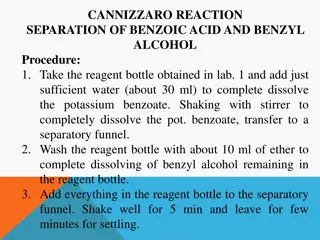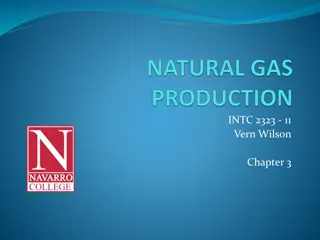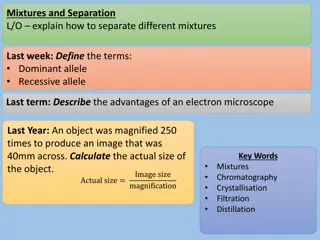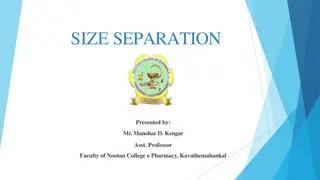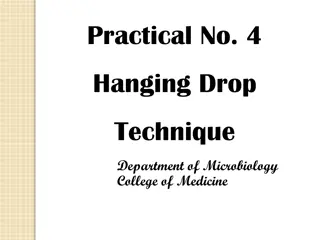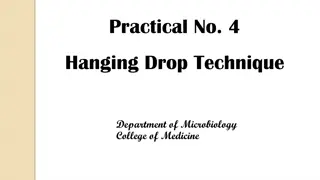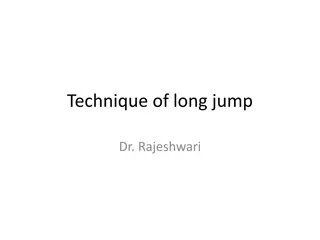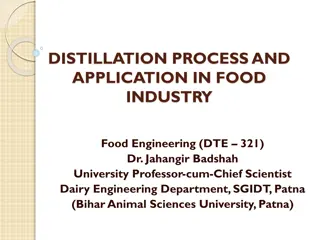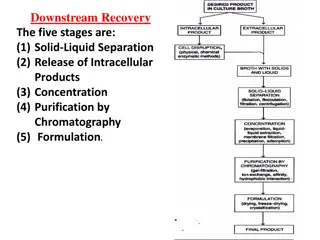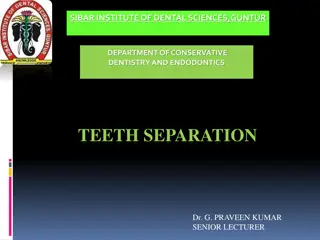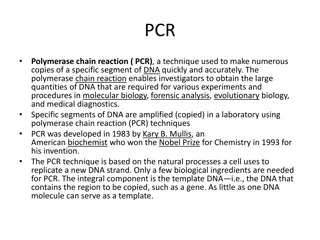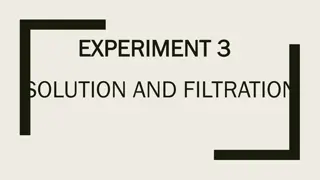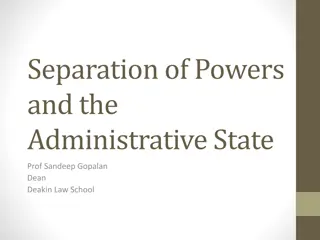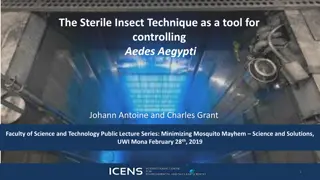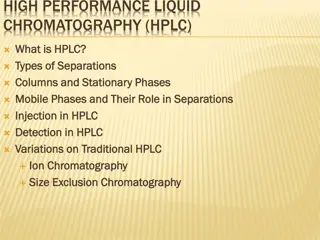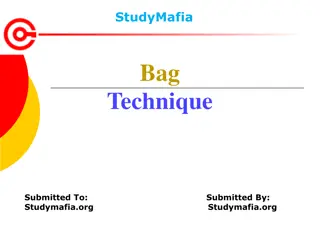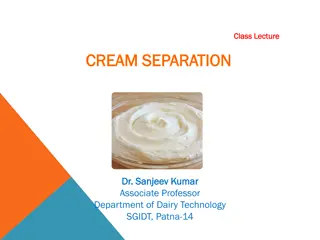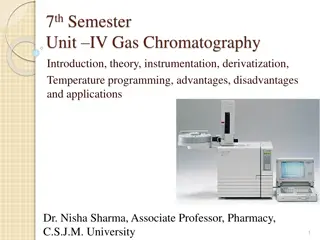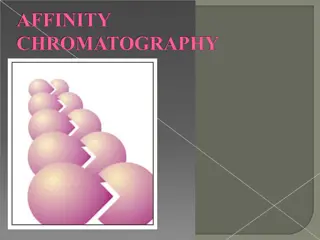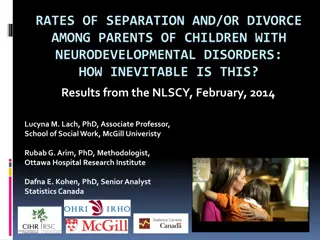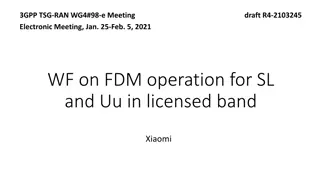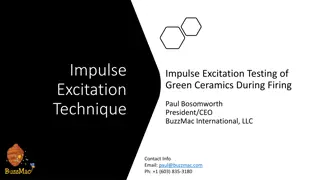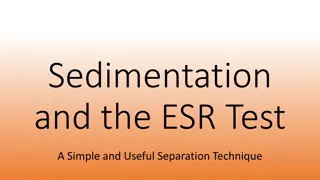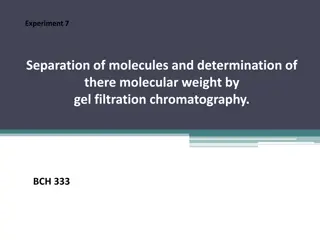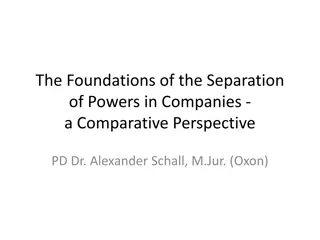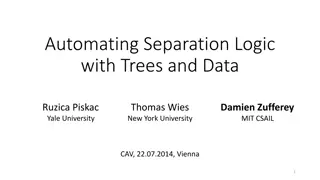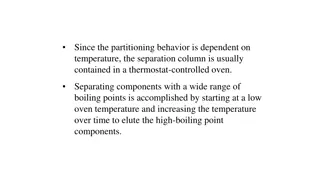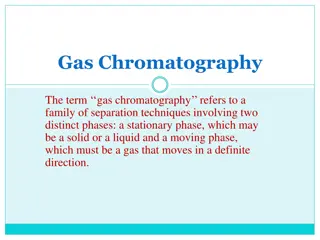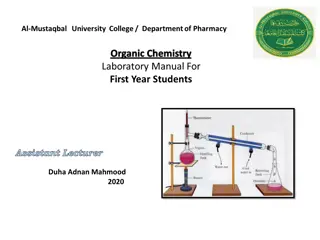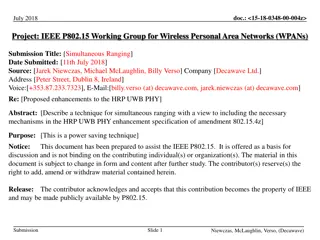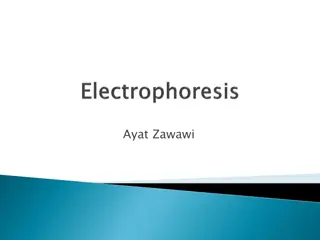Understanding Medical Separation with Reinstatement Rights (MSWR)
Explore the key elements involved in placing a student on Medical Separation with Reinstatement Rights (MSWR), including consultation with Wellness staff and recent policy changes. Delve into scenarios where MSWR might be needed and understand the process of Medical Separations in Job Corps. Gain in
2 views • 26 slides
Cannizzaro Reaction: Separation of Benzoic Acid and Benzyl Alcohol
The Cannizzaro reaction involves the separation of benzoic acid and benzyl alcohol by utilizing various reagents and procedures such as dissolving potassium benzoate, washing with ether, and treatment with different solutions to isolate the desired compounds. The process involves multiple steps incl
7 views • 4 slides
Understanding Separation Processes in Gas Production
This presentation delves into the importance of separating gases, oils, and solids in the well stream for effective field processing. It covers the theory of separation, different processes involved, types of separators, and their specific uses, such as vertical and horizontal separators. Images and
1 views • 23 slides
Understanding Mixtures and Separation Techniques
Explore the concepts of mixtures and separation, from the definition of dominant and recessive alleles to the advantages of electron microscopes. Learn about identifying pure substances, differences between pure and impure substances, and techniques like filtration and crystallization for separation
1 views • 19 slides
Understanding Size Separation in Pharmaceutical Processing
Size separation is a crucial unit operation in pharmaceutical manufacturing, involving the segregation of particles based on physical differences like size, shape, and density. This process, also known as sieving or screening, is essential for improving powder mixing, particle solubility, and stabil
1 views • 31 slides
Introduction to Hanging Drop Technique in Microbiology
The hanging drop technique is a method used in microbiology to observe living microorganisms suspended in a fluid under a microscope. This technique allows for the examination of motility and morphology of bacteria, providing valuable information for research and analysis. By creating a wet mount us
0 views • 17 slides
Microbiology Study: Hanging Drop Technique in Department of Microbiology, College of Medicine
In the Department of Microbiology at the College of Medicine, the Hanging Drop Technique is utilized to study live microorganisms. This technique involves suspending microorganisms in fluid on a hollow ground slide, allowing for observation of their morphology under a microscope. By creating a wet m
0 views • 8 slides
Mastering the Long Jump Technique with Dr. Rajeshwari
The long jump, a combination of speed, technique, and precision, is more than just the jump itself. Dr. Rajeshwari explains the key elements such as setting up the approach, drive and transition phases, as well as the attack phase and final steps to excel in this track and field event. Learn from th
0 views • 10 slides
Distillation Process and Applications in Food Industry
Distillation is a separation process used in the food industry to separate components in a mixture based on their volatility. It involves vaporization, condensation, and re-evaporation to achieve separation. Steam distillation is a method where steam is used to reduce boiling temperatures for safe s
1 views • 13 slides
Key Steps in Downstream Processing: Recovery and Separation Techniques
The downstream recovery process involves five major stages: solid-liquid separation, release of intracellular products, concentration, purification by chromatography, and formulation. Solid-liquid separation methods include flotation, flocculation, and filtration using techniques like depth filters,
0 views • 33 slides
Tooth Separation in Conservative Dentistry and Endodontics: Methods and Importance
Tooth separation is essential in restorative procedures to enhance convenience, achieve proper contacts and contours, improve operative treatment outcomes, and maintain oral health. This process involves slightly moving teeth apart or closer, or changing their spatial position. Different methods suc
1 views • 28 slides
PCR and Blot Techniques in Molecular Biology
Polymerase Chain Reaction (PCR) is a crucial technique for amplifying specific DNA segments rapidly and accurately. Developed in 1983, PCR is widely used in various fields such as molecular biology, forensics, evolution, and medical diagnostics. On the other hand, the Blot technique transfers DNA, R
0 views • 10 slides
Separation and Purification of Organic Compounds: Methods and Techniques
The separation and purification of organic compounds are essential processes to obtain pure products, as impurities and side reactions can affect the quality of the compounds. Methods such as solution and filtration, crystallization, distillation, extraction, sublimation, and chromatography are comm
8 views • 15 slides
Principles of Separation of Powers in the Administrative State
Understanding the principles of separation of powers - including the separation of functions, division of power, checks and balances, bicameralism, and federalism - is crucial in maintaining a system where governmental entities coexist harmoniously while preventing the concentration of political pow
0 views • 20 slides
Utilizing Sterile Insect Technique for Aedes Aegypti Control
The Sterile Insect Technique (SIT) is a biologically-based method used to manage key insect pests by releasing sterile insects to decrease population reproduction. This technique, developed through genetic manipulation and ionizing radiation, has been instrumental in controlling insect populations l
0 views • 13 slides
An Overview of High Performance Liquid Chromatography (HPLC)
High Performance Liquid Chromatography (HPLC) is a powerful analytical technique used for separating and identifying compounds in a mixture. It involves a mobile phase and a stationary phase to achieve separation based on different physicochemical properties. The mobile phase plays a crucial role in
0 views • 20 slides
Understanding Boundary Layer and Drag Forces in Fluid Dynamics
Boundary layer module explains the presence of viscous forces near a surface due to fluid flow, leading to laminar or turbulent boundary layers. Flow separation occurs when a boundary layer detaches from a surface, impacting lift and drag forces. Adverse pressure gradients and flow separation phenom
0 views • 19 slides
Insights on Separation of Spouses in Islam
Explore the guidelines for marital relationships and separation in Islam as per the Quran, emphasizing mutual consent, reconciliation methods, and types of separation. The discussion covers judicial divorce, extra-judicial divorce (Khul and Talaq), and critical terms like Mahr and Nikah. Understandi
0 views • 31 slides
Urban Design Techniques for City Improvement
Urban design techniques play a crucial role in urban improvement by providing concepts and tools for city building. Some of these techniques include the Open Space Technique, Transportation System Technique, Capital Network Technique, Public Policies Technique, Physical Design Technique, Plug-in Tec
1 views • 11 slides
Efficient Nursing Care with Bag Technique: Principles, Considerations, and Steps
Learn about the Bag Technique in nursing, a method utilizing a public health bag to perform procedures during home visits efficiently and effectively. Explore the principles, considerations, and steps involved in implementing this technique to minimize infection spread and ensure optimal patient car
0 views • 21 slides
Cream Separation Methods and Principles in Dairy Technology
Cream separation in dairy technology involves various methods such as centrifugal and gravity methods. The purpose is to obtain fat-reduced or fat-free milk, concentrate milk fat, standardize fat content, and recover fat. The separation is based on the principle that milk fat is lighter than skim mi
1 views • 12 slides
Gas Chromatography: Introduction, Theory, Instrumentation, Derivatization
Gas chromatography is a powerful analytical technique used for separating and analyzing volatile compounds. It involves a mobile gas phase passing through a stationary phase, with components in the mixture interacting differently, resulting in separation. The technique dates back to 1905 and has evo
0 views • 12 slides
Understanding Salvation and the Role of Jesus in Christian Belief
Salvation in Christianity involves liberation from sin and its consequences, particularly separation from God and death. Early Church Fathers emphasized the connection between separation from God and mortality, highlighting the need for Jesus to reverse this separation through the Incarnation. By un
1 views • 15 slides
Affinity Chromatography: A Breakthrough in Biochemical Research
Affinity chromatography, developed in the 1930s by A. Wilhelm Tiselius, is a vital technique for studying enzymes and proteins. It relies on the specific affinity between biochemical compounds and utilizes matrices like agarose for binding sites. Ligands such as amino and hydroxyl groups play crucia
1 views • 27 slides
Satisfiability Modulo Abstraction for Separation Logic with Linked Lists
This study explores the application of satisfiability modulo abstraction in separation logic with linked lists. It presents a technique using abstract interpretation concepts to handle separation logic formulas beyond previous methods, specifically focusing on over-approximating heaps that satisfy t
0 views • 41 slides
Rates of Separation and Divorce Among Parents of Children with Neurodevelopmental Disorders
Research conducted in 2014 examines the impact of caring for a child with a neurodevelopmental disorder (NDD) on rates of separation and divorce among parents. Factors predicting separation/divorce are explored, highlighting the challenges faced by families of children with NDDs. The study emphasize
0 views • 31 slides
Discussion on FDM Operation and Frequency Separation in Licensed Bands
Discussion during the RAN4#98-e meeting focused on the introduction of FDM operation of UL and SL in licensed bands. Topics included carrier options, frequency separation in adjacent and non-adjacent channels, power issues, and recommendations for further investigation. The meeting explored options
0 views • 9 slides
Impulse Excitation Technique for Monitoring Green Ceramics During Firing
The Impulse Excitation Technique (IET) is a nondestructive testing method employed to monitor the elastic properties of green ceramics as they undergo firing processes. This technique allows for the analysis of phase changes and material behavior at high temperatures, providing valuable insights int
0 views • 6 slides
Understanding Sedimentation and ESR Test in Separation Techniques
Sedimentation is a crucial separation technique where insoluble particles settle out of a solution due to gravity. It plays a vital role in various industries like food, beverage, pharmaceutical, and water treatment. The Erythrocyte Sedimentation Rate (ESR) test, a micro-level sedimentation process
0 views • 13 slides
Gel Filtration Chromatography: Separation and Molecular Weight Determination
Gel filtration chromatography is a method used for separating proteins based on their molecular weights. This experiment aims to teach students the principles of gel filtration chromatography and provide hands-on experience in the lab. By utilizing a stationary phase of porous beads and a mobile pha
0 views • 22 slides
The Foundations of the Separation of Powers in Companies
The separation of powers in companies is based on the dualism of organs: the Board and General Meeting. The actual situation in companies diverges between large public companies with autonomous management and smaller private companies with owner-operators. The search for the foundations of the separ
0 views • 15 slides
GCSE Separation Challenge: Iron, Sulfur, Sand, and Food Dyes Mixture
Students are tasked with separating a mixture containing iron, sulfur, sand, and food dyes using various techniques. They work in pairs, following provided instructions and using specific equipment. Marks are awarded based on successful separation and organization. The challenge involves planning, e
0 views • 8 slides
Automating Separation Logic with Trees and Data
This content discusses the automation of separation logic using trees and data, focusing on extracting the maximum element in a Binary Search Tree (BST). It covers the motivation behind the procedure for extracting the max element, memory safety considerations, functional correctness, and preserving
0 views • 38 slides
Understanding Gas Chromatography Techniques and Applications
Gas chromatography is a powerful analytical technique used for separating and analyzing volatile compounds in various industries such as food analysis and drug identification. The process involves a separation column contained in a thermostat-controlled oven, along with a carrier gas system and dete
0 views • 11 slides
Understanding Gas Chromatography: Principles, Applications, and Strengths
Gas chromatography is a separation technique involving a stationary phase and a gas mobile phase. The principles involve flowing a gaseous mobile phase through a column for separation based on component interactions. While its use in drug analysis has declined with the advent of HPLC, GC is still va
0 views • 22 slides
The Day of the Lord: What Kind of People We Ought to Be
Jesus speaks of his second coming and emphasizes the importance of readiness by using the examples of Noah's time and the need for disciples to be vigilant. The unpredictability of the day of judgment is highlighted, urging people to be prepared for the separation of good and evil. Normalcy and sudd
0 views • 10 slides
A Guide to Choosing the Best Cell Separation Technique for Your Lab
we will explore several effective cell separation techniques, with a focus on Antibody Cell Separation and other methods that can enhance your laboratory\u2019s capabilities. visit us :- \/\/uberstrainer.com\/
1 views • 9 slides
Understanding Distillation in Chemistry: Purification and Separation Methods
Distillation is a crucial process in chemistry for purifying organic compounds by selective evaporation and condensation. It involves the separation of substances based on their boiling points, resulting in either nearly pure components or increased concentrations of specific compounds in a mixture.
0 views • 14 slides
Enhancing HRP UWB PHY through Simultaneous Ranging Technique
This document discusses a power-saving technique known as simultaneous ranging, proposed for inclusion in the IEEE P802.15.4z standard amendment. The technique allows for efficient distance measurement in scenarios such as automotive applications by configuring multiple devices to respond simultaneo
0 views • 16 slides
Understanding Electrophoresis and Its Applications in Biochemistry
Electrophoresis is a vital process in biochemistry that allows for the separation and analysis of charged molecules based on factors such as net charge, size, and electrical field strength. This technique, commonly used in DNA analysis and protein separation, relies on the migration of charged parti
0 views • 14 slides

